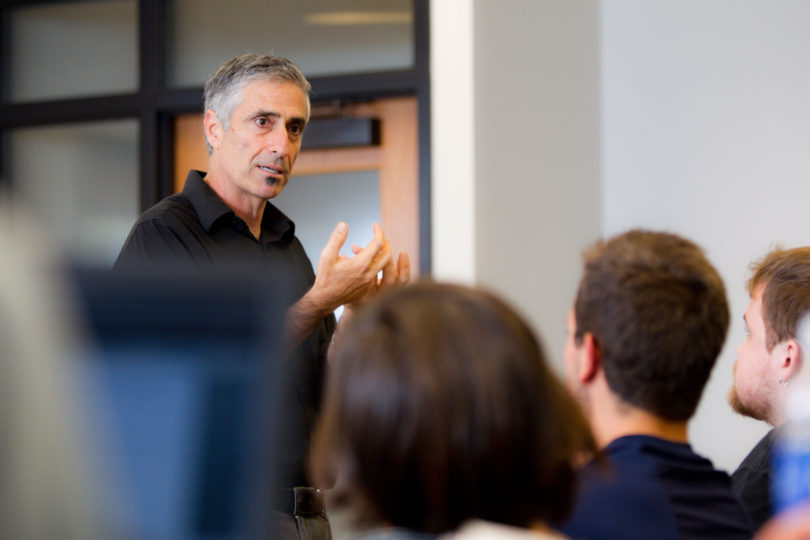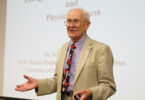Jeffrey Berejikian
Associate Professor of International Affairs
By Matt Weeks
Jeffrey Berejikian is the kind of teacher that makes his students think—and think hard.
His classes are known for engaging lectures, nontraditional teaching strategies and demanding assignments. But it’s his enthusiasm for his work, both as a researcher and as a teacher, that makes students sign up for his notoriously difficult classes again and again.
“I love this class and have recommended it to all my friends who share my major,” an undergraduate student said. “Dr. B is amazing, and I would take any class available with him as a professor. I know I have learned a lot in this course because I find myself relating the topics not just to other courses, but to everything.”
A gifted lecturer-and stranger to PowerPoint presentation software-Berejikian is known for teaching classes that are marked not only by absorbing lectures, but also by innovative approaches to pedagogy that challenge students to think in new and interesting ways. Students in his classes receive their lessons through discussions, role-playing exercises, small group projects and computer simulations.
The caring and careful attention to pedagogy already has earned Berejikian accolades from his students and peers. He’s been awarded the School of Public and International Affairs Award for Excellence in Teaching, the Russell Award for Excellence in Undergraduate Teaching, the Student Government Association Award for Teaching, and he has been recognized as a Senior Teaching Fellow, a member of the UGA Teaching Academy, a Lilly Teaching Fellow Faculty Mentor and a Roosevelt adviser, among others.
His novel approach to teaching connects with students at all levels-from freshman to tenured faculty well into their careers.
“The information acquired in his class was the catalyst for a new career direction for me,” said Corrie Brown, a Josiah Meigs Distinguished Teaching Professor of Pathology, after she took a class with Berejikian through a Study in a Second Discipline Fellowship. “So if a faculty member with 30 years of experience in a specific discipline can feel energized and motivated enough by a class to alter the path towards a brand new area, imagine the impact on undergraduate students.”
William Finlay
Professor of Sociology
By Sam Fahmy
As a young assistant professor, William Finlay found the prospect of teaching daunting. Now, nearly 30 years later, the head of the sociology department in the Franklin College of Arts and Sciences has earned UGA’s highest recognition for superior instruction.
“Facing a new group of students each semester is something that I never get tired of,” Finlay said. “I find that every class is different, and I’m always thinking of different ways of explaining the material.”
His teaching style emphasizes getting every student in the classroom involved-from the hyper-motivated in the front all the way to the “I’d rather be on Facebook” set in the back. In his “Work and Industry” class, for example, he begins lessons with an opportunity for students to share their relevant work experience. Instead of multiple-choice tests, his students analyze selected newspaper articles and relate them to the subject matter.
In addition to teaching on campus, Finlay has been involved in study abroad for two decades. He developed a course in Italy and, more recently, a program in South Africa in which students learn about the country’s transition from apartheid to democracy and its integration into the global economy. Just as importantly, they learn about their capacity to be agents of change through service-learning projects in an impoverished township.
“The places I have seen and the people I have met have challenged me in ways I never could have imagined,” said one student, “and I am forever enriched because of these experiences.”
Finlay’s dedication to students continues well after the class period is finished, outside of office hours and even long after graduation. Former student Ashley Mears recalls how an independent study with Finlay led to a peer-reviewed journal article, and ultimately to her current position as an assistant professor of sociology at Boston University. In the acknowledgements section of her recently published book, she writes: “When I was an undergraduate at the University of Georgia, I was fortunate to study with William Finlay, who gave me a push just when I needed it, and who continues to be a mentor.” She goes on to add, “It is a tall order, but I aspire to be so effective in mentoring my own students.”
Jean Martin-Williams
Professor of Horn
By Alan Flurry
Jean Martin-Williams’ career embodies the high standards and rigorous practice regimen required to perform in some of the greatest concert halls in the world. That commitment informs the care and dedication required to guide her students—and be a mentor for younger colleagues.
In addition to her teaching duties, which extend to private lessons for undergraduate and graduate students, Martin-Williams is director of the Lilly Teaching Fellows Program, which is under the auspices of the Center for Teaching and Learning.
Her leadership and involvement also exemplify Martin-Williams’ commitment to the success of her students. When approached to direct the program, she requested a visiting professor be hired to assist with her studio instruction.
“She found a way, by rotating students through both of their studios, to enrich the perspective and experience of all her students, and this has been done with great success,” said Dale Monson, director of the Hodgson School of Music.
Martin-Williams maintains an active career as a performing musician. With more than 100 performances in New York’s Carnegie Hall and many other venues throughout the U.S. and internationally, her musicianship and professionalism are crucial performance elements that cross into the classroom and back again. Many of her horn studio alumni now teach and/or play professionally.
Martin-Williams brings top colleagues to campus to perform concerts and give master classes and lends her talents to other programs. For the past 13 summers, she has been on the faculty of the Brevard Music Center Summer Institute and Festival. The Juilliard School in New York invites her to its campus yearly to present lectures on “The Role of the Artist on a College Campus.” During the current academic year, she has served as the Franklin Administrative Faculty Fellow.
“Numerous people [have] asked me, ‘how does a music education degree prepare you for the rigors of law school?’” said Devin Gordon, a 2001 First Honor Graduate in music education and now a practicing attorney in Atlanta. “Much of my readiness came as a direct result of numerous experiences Dr. Martin-Williams provided to me. [Her] dedication to her students, and to her music, makes her an indispensable asset to the UGA faculty.”
Jim Moore
Distinguished Research Professor of Large Animal Medicine
By Sara Freeland
Jim Moore doesn’t horse around.
At least not when it comes to teaching and research in the College of Veterinary Medicine.
Moore is an equine surgeon who has taught in the classroom, the teaching hospital and the research laboratory since joining UGA in 1981.
He’s best known for collaborating with Thel Melton, Mac Smith and Flint Buchanan to develop The Glass Horse, a 3-D program used internationally to teach about equine gastrointestinal disorders.
“The Glass Horse has completely revolutionized how veterinary students learn about equine gastrointestinal anatomy and colic,” said Vanessa Cook, an associate professor at Michigan State University. “The 3-D technology allows students to visualize what is actually happening in the horse. I use it to teach students about colic-I don’t know how any of them ever understood the complex anatomy of the horse’s gastrointestinal tract before this technology was available.”
Moore is dedicated to learning at all levels-from teaching middle and high school students about osmosis with 3-D models to working with undergraduates in the Honors program to mentoring post-veterinary school graduate students.
He gets the highest praise from his students.
“Dr. Moore is just about the best thing since sliced bread,” said a student in a course evaluation. “His lectures were engaging and clear, and his use of visual aids was phenomenal. He’s so approachable.”
Moore wants students to enjoy learning the material as much as he enjoys sharing it with them.
“I relish opportunities to see them smile or laugh during the process and see the light go on for students who may have had little interest in a particular topic,” he said. “You never know what will grab your interest, and I think it is important for our students to realize that they might find themselves working in areas that never occur to them when they walk in the front door of the college.”
Moore admits he’d never touched a horse until his second year of vet school-and then was hooked within weeks. He found gastrointestinal diseases fascinating and has since spent his career studying exactly that.
“Things were life and death,” he said. “The horses needed emergency abdominal surgery in the middle of the night, and it was simply too compelling to leave.”







